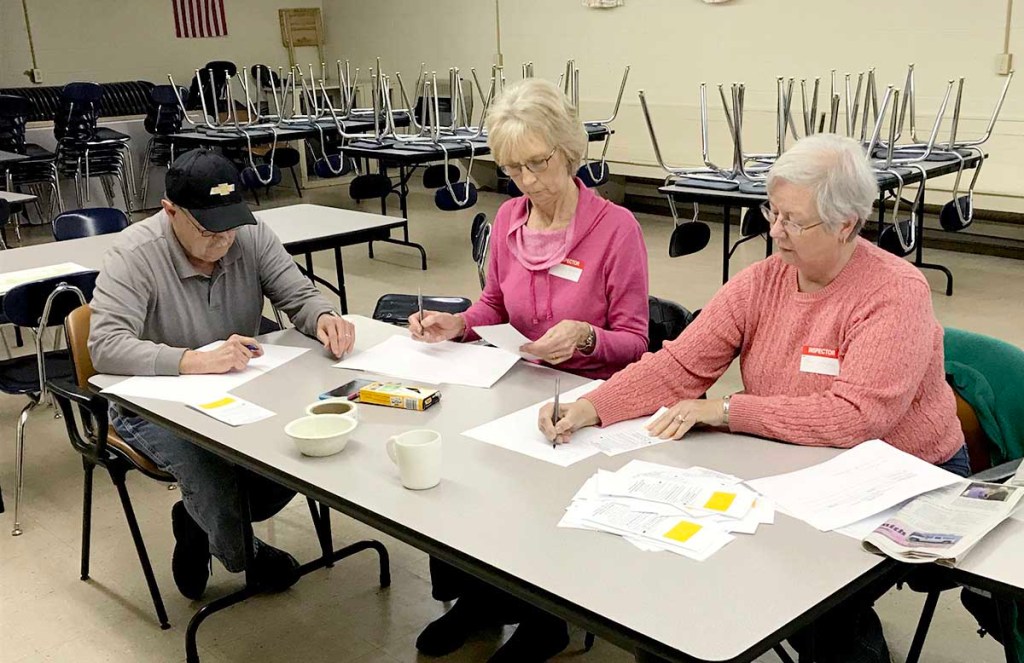Bill to freeze sales tax sharing among Cullman County towns passes Alabama House
Published 5:30 am Saturday, May 9, 2020

- Poll workers, from left, Tony Duke, Mary Sue Freeman and Marie Sanford count votes after polls closed for the Berlin incorporation vote in Feb. 2018.
Any municipalities that might one day form in Cullman County will likely need to fully pay their own way by establishing their own dedicated in-town taxes and fees, if a new local bill makes it past the governor’s desk.
The bill, sponsored by Republican Alabama Rep. and former Good Hope Mayor Corey Harbison, would freeze the existing sales tax funding structure already on the books for the county’s 12 municipalities, by requiring that any towns that incorporate in the future find their own sources of revenue to fund public operations such as streets, sewer, staffing, programs, and other infrastructure.
Four separate pieces of long-standing legislation govern the way municipalities are funded in Cullman County, setting aside a share of sales tax revenues collected in the retail-dense City of Cullman to divide among the county’s 11 remaining cities and towns.
The new bill does not tell any future towns how they must fund themselves, said Harbison. Rather, he said, it simply prevents more towns that might one day incorporate from cutting into a major funding source for existing towns — places that base their annual budgets on a finite funding stream that shrinks every time another new town incorporates.
“This bill in no way prevents anyone from incorporating or makes it harder to go through the incorporation process,” said Harbison on Friday. “What it does do is preserve an important source of revenue that current municipalities in Cullman County already rely on.”
Cullman Mayor Woody Jacobs noted that the bill doesn’t affect the City of Cullman, whose sales tax base helps generate revenues that disproportionately contribute to the pool of money that’s split between the county’s other 11 municipalities.
“Cullman is the one place that isn’t affected, because that share that we turn over to the rest of the county already has been set by the legislature,” he explained. “But it does affect everyone else, because if a new town were to form, it would automatically get access to its piece of that share, which dilutes the overall amount that’s divided among all the others.”
Municipalities typically must self-fund basic services, and all of Cullman County’s towns and cities currently are able to provide street and, where applicable, sewer services at a minimum. But only two local municipalities — Cullman and Hanceville — go beyond that, maintaining their own standing police and fire departments. The rest are covered by the Cullman County Sheriff’s Office for law enforcement service, and by a network of local volunteer departments for fire service.
Hanceville Mayor Kenneth Nail said Friday that he’s in favor of the bill, and guessed that most other municipal leaders countywide are as well.
“We’re one of the only counties in the state that shares revenues with sales tax,” said Nail. “The problem with that is, if every crossroads in Cullman County were to incorporate, then they automatically can claim a diminishing slice of the overall sales tax pie. I personally don’t think that’s fair — and I doubt many other officials think it’s fair — to the existing towns that operate under an existing set of financial expectations.
“When you incorporate, you’re committing to provide your residents a basic set of services, and under the system that we’ve had, the incentive isn’t there for folks who want to incorporate to make a connection between raising their own revenues and spending on services they’re gonna have to provide. It’s easy to want a slice of a pie that’s already there, but it’s something else when you start thinking about whether you have a business and retail base that would actually let you pay your own way.”
The bill does not change any aspect of the county’s current sales tax funding structure. Instead, it simply freezes that structure so that current municipalities are assured it will continue to be divided, according to their populations, among its 12 existing cities and towns.
Harbison said he introduced the bill this year because doing so doesn’t negatively affect any current effort to incorporate a new town in Cullman County.
“I’ve had several mayors over the past few years ask me about doing this type of legislation. And I was always hesitant to do it, because we had a community at Berlin that was actively working to incorporate, and I didn’t want to take action that would have affected anyone’s specific effort to do that,” he said. “But now that there’s no active incorporation effort, the timing was right. It protects the funding that all of our current towns expect to receive, which was the big concern that I was hearing from our local mayors.”
The bill passed the Alabama House of Representatives this week, with all members of the local legislative delegation voting to support it. The Alabama Senate has until the May 18 end of the regular session to sign off on the bill, which would then go to Gov. Kay Ivey for final approval.


